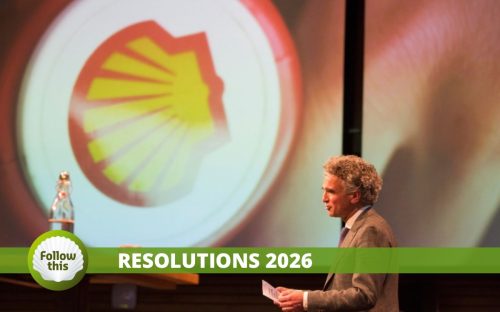PRESS RELEASE
Energy crisis has eclipsed climate crisis
The fight against the climate crisis loses momentum at BP: support for Paris-consistent climate targets (resolution 24) decreases to 15% (down from 21% in 2021).
Response by Follow This
“BP may have convinced investors that addressing the current energy shortage overrides addressing climate change,” responds Mark van Baal, founder of Follow This, the organization that filed the climate resolution. “Neither our climate resolution nor BP’s strategy have changed; their current strategy still does not lead to emission reductions by 2030. However, investor sentiment apparently has changed, likely as a result of the energy crisis and windfall profits brought on by the war in Ukraine.”
“Investors’ short-termism, fueled by the current windfall profits of BP, might have prevailed over the medium-term risk of value destruction caused by the climate crisis.”
“Both crises can and should be dealt with simultaneously by shifting investments to renewables; the current windfall profits provide the company with the necessary capital to make the enormous investments in the energy transition required to address the climate.
“Today’s voting results are a loss in the fight against the climate crisis. Today, everybody loses, except the board of BP. They could interpret the decrease of investor support as a mandate to stick with its business model for another year, a business model that exacerbates the climate crisis.”
“The 15% percentage of shareholders that voted in favour of the climate resolutions show that a significant number of investors still want to see Paris-aligned emission targets. Now is the time to amplify the voice of these investors who take the long-term interest of BP and its shareholders into consideration.”
During the AGM, the question, will BP’s absolute emissions decrease by 2030? (necessary to achieve Paris) – asked by Jesper Vaarwerk of Follow This – was not answered by CEO Bernard Looney.
Minority of shareholders rebels against BP’s plan to stall climate action
“We recognize that 15% of the shareholder votes is still significant and we thank these shareholders for their efforts to safeguard the climate. Together with them, we will remind fellow shareholders what’s at stake. We hope we can convince them before the AGMs of Shell, Exxon, and Chevron, happening in 2 weeks.”
BlackRock, which held almost an 8% stake in the company in 2021, voted in favour of our proposal in 2021; they may have shifted their vote from FOR in 2021 to AGAINST in 2022.
“At BP, another year of IPCC’s ‘rapidly closing window’ to address the climate crisis is lost.”
Confusion created by in-house resolution
BP’s in-house climate resolution (3) received 88.5%. Both voting results contrast with the other 22 resolutions where up to 99% of shareholders followed management voting advice. This signals discontent with BP’s current strategy.
In-house resolutions only create confusion as seen with Shell last year. At Shell, in 2021, 89% voted for the in-house resolution and 30% for the Follow This resolution. Does a vote against an in-house resolution mean that investors want more climate action, less climate action, or no climate action at all? Does a vote in favour of an in-house resolution mean that investors are satisfied with the current inadequate targets or that they want more? A group of shareholders has voted for both resolutions to encourage BP to advance its targets.
The only climate resolutions which bring clarity are shareholder resolutions that ask for Paris-aligned targets.
Other possible explanations:
- Although less likely, the reason for the decline in votes could be that BP made shareholders believe that a company can be Paris-aligned without decreasing emissions this decade.
- Investors who voted in favour last year might have divested from their stake in BP.
- Investors might be put to sleep by BP’s new promise to be net zero by 2050.
- The war in Ukraine might have changed the focus from emissions reductions to energy security.
- BP successfully exploited the energy crisis to stall action on the energy climate crisis.
Remarks
- Activist climate resolution exposes shareholder discontent with flaws in BP plan.
- In 2019, 8.4% was enough to compel BP to reluctantly set Scope 3 targets.
“We have lost a precious year in the fight against climate change at BP; a year in which the company will continue to increase emissions, with the consent of their shareholders. We have not succeeded in convincing investors of the devastating financial consequences of their votes against Paris-alignment. Together with likeminded investors and partners we will amplify our message that only voting will change Big Oil. We thank the investors who voted for the Follow This climate resolution and against BP’s in-house resolution. They are the true change agents in the fossil fuel industry; an industry that has proven to be change-averse.”











